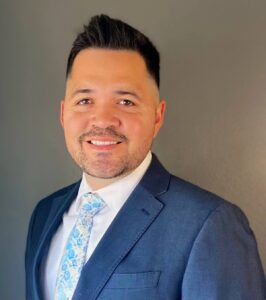 Cristian Clavijo is a Sr. R&D Project Manager at Thermo Fisher Scientific, where he works on protein purification and cancer therapy instrumentation. He is a University of Utah Department of Mechanical Engineering alum with a combined BS/MS. He went on to complete a PhD in Mechanical Engineering at BYU with a specialization in Fluids Mechanics and Heat Transfer.
Cristian Clavijo is a Sr. R&D Project Manager at Thermo Fisher Scientific, where he works on protein purification and cancer therapy instrumentation. He is a University of Utah Department of Mechanical Engineering alum with a combined BS/MS. He went on to complete a PhD in Mechanical Engineering at BYU with a specialization in Fluids Mechanics and Heat Transfer.
Mechanical engineering was a leap into the unknown for Clavijo. No one in his family had been a mechanical engineer, but he had always been good at math. With his family’s encouragement, he came to the U and studied mechanical engineering. Classes like numerical methods, thermodynamics, and heat transfer were his favorites.
“I got into Fluid Mechanics and Heat Transfer because they were heavy in math. I was never a very hands-on, tinkering type of engineer. I preferred to solve math problems,” said Clavijo.
Clavijo also discovered an interest in medicine during his tenure at the U. At the end of his bachelor’s program, he had an internship in tissue engineering / regenerative medicine, then went on to work on heat transfer for medical devices during his masters. Going into the medical industry after his PhD was a natural progression.
Over his career, Clavijo has worked with medical device companies, first Becton Dickinson, before eventually moving to Thermo Fisher Scientific. In his current role, Clavijo drives new product ideas from concept to commercialization. He leads cross-functional teams from R&D, quality, manufacturing, product management, supply chain, and more. He coordinates with representatives from these departments daily to facilitate internal alignment and ensure customer commitments are delivered in a timely manner. He also presents regularly on these projects to senior leadership.
When talking about his path from school to career, Clavijo highlighted the importance of the fundamentals of physics and engineering.
“The fundamentals will give you a strong foundation for your future career regardless of which direction you go, even outside of engineering,” Clavijo said.
He also highlighted the importance of skills beyond engineering in the workforce.
“Get involved with projects or programs where you have to translate unmet customer needs into solutions,” said Clavijo. “This is what every company seeks to do. You should also seek opportunities to grow your leadership skill, whether engineering related or extracurricular. The point is to help grow your soft skills which are essential whether you go into highly technical or leadership roles.”